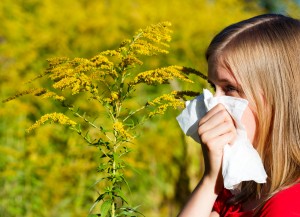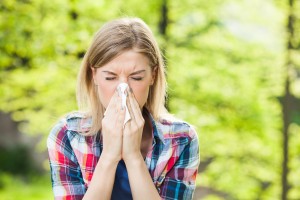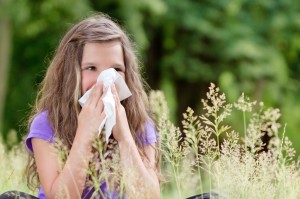Charlotte has had an unusually warm winter, and while it might be nice to walk around without jackets in December, the warm weather can also cause problems for allergy sufferers. Dr. Stephen B. Clyne of Charlotte Eye Ear Nose & Throat Associates, P.A. joins us this month to talk about the longer allergy season and why the weather affects allergy sufferers.
Why do we get pollen allergies primarily in the spring and summer?
Pollen counts vary throughout the year and seasonally but, in general, tree pollen counts are highest in spring and grass pollens are highest in late spring and summer. Ragweed and other weed pollens are highest in the fall, so really we have at least three seasons of high allergen counts in this region.
We’ve had an unseasonably warm winter. How does that affect mold, pollen, and other seasonal allergies?
Most outdoor pollens die when temperatures are below freezing for sustained periods so once we get that first frost in the winter most ragweed and other weed pollens are killed off. A late frost can prolong ragweed allergy season but once it is killed off due to freezing it usually will not come back. A mild winter can also lead to an earlier start to allergy season in the spring and higher grass and tree allergen counts.
When the temperature drops to a seasonably-normal temperature, does that cause allergies to go back to normal?
Temperature and humidity both can affect pollen counts and, in general, pollen counts are highest when it is warmer and more humid. Mold counts are more variable than grass, trees, and weeds and can fluctuate throughout the year depending on humidity and temperature and other factors.
If the temperature is constantly going up and down (high 50s one day, mid 30s the next, for example), how can that affect allergies?
Temperature changes can affect allergy sufferers because of the effect on allergen counts but also because people are more likely to be outside when it is warm and, therefore, exposed to more outdoor allergens. Conversely, patients with indoor allergies to dust mites and pets may suffer more when it is cold since they are spending more time indoors.
Pollen counts have been on the rise steadily for the last few years. Do you see that continuing into 2016 and beyond, especially in light of this season’s warm winter?
Yes pollen counts are rising, most likely due to rising climate change, and will most likely continue to do so if temperatures continue to rise.
Is humidity a factor as well as temperature? Would a humidifier or dehumidifier help people with allergies?
All things being equal allergies tend to be better in dryer conditions. It is ideal to keep humidity in your house below 50% and 35-40% is probably more ideal. We live in a pretty humid region, so a dehumidifier is sometimes helpful if there is a damp room in the house, like a basement. Humidifiers can help relieve nasal symptoms during dry months in the winter but you have to be careful to keep them clean and free of mold buildup.
How should allergy patients deal with any increase in the length of time they show allergy symptoms, especially if they just take over-the-counter medicines to treat them? Should they try different medicines? Should they take more?
First I would say whenever you are having significant trouble with pollen allergies you should consult your primary care physician and/or see an otolaryngologist or general allergist. There are good medicines available over the counter including non-sedating antihistamines like Allegra, Claritin, and Zyrtec, and now there are over-the-counter intranasal steroid sprays like Flonase and Nasacort. Antihistamines can be take as needed depending on symptoms, but intranasal steroid sprays need to be taken daily throughout allergy season and allergy medicines work best when taken before the onset of symptoms, which is not always easy to do. If one or both of these medicines are not controlling your symptoms you should definitely see a doctor.
At what point should they see a doctor or start taking prescription medication/shots?
Patients should see a doctor when their symptoms are not controlled with over-the-counter medicine or if they would like to consider allergy testing to find out what they are allergic to or to consider allergy shots.
If a patient’s symptoms get worse in the warm weather, will a more seasonably-cold winter make their symptoms go back to normal?
Yes, especially when we get sustained temperatures below freezing to kill off outdoor pollen. But remember, you will be spending more time indoors so you have to be careful if you are allergic to dust mites, molds, or pet dander.
Is there anything else important for allergy patients to know regarding unusual seasonal weather and how it will affect them?
Because fluctuations in weather are impossible to predict, the best way to protect yourself if you have significant year round indoor and outdoor allergies is to stay on allergy medicine all year rather than trying to time it and take it as needed. When in doubt see your primary care physician or an otolaryngologist or general allergist.
 Dr. Clyne is a comprehensive otolaryngologist who attended Duke University for his undergraduate degree and Wake Forest University School of Medicine for his medical degree. He did his internship and residency at Wake Forest University Baptist Medical Center. He practices in our Pineville office.
Dr. Clyne is a comprehensive otolaryngologist who attended Duke University for his undergraduate degree and Wake Forest University School of Medicine for his medical degree. He did his internship and residency at Wake Forest University Baptist Medical Center. He practices in our Pineville office.
![]()
Charlotte Eye Ear Nose & Throat Associates



